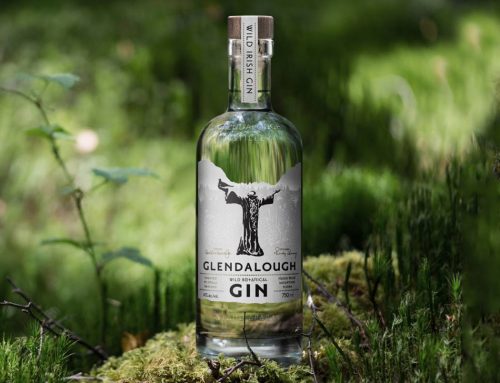
Bar 1661 in Dublin, voted last year’s Best Cocktail Bar in Ireland, by Irish Craft Cocktail Awards 2019, is the world’s first poitín-focused cocktail bar.
We spoke with Bar 1661 owner Dave Mulligan, poitín expert and enthusiast about the history of Ireland’s first spirit, from its humble roots to its illegal production throughout the country for over 300 years.
Known as the Original Irish Spirit, poitín was first made by monks in Ireland as early as the sixth century, long before whiskey was produced in any country. Throughout history, poitín was at the core of Irish culture—local craftspeople, and even groups of townsfolk would distill the spirit for personal consumption or to share with fellow villagers. Threatened by its inability to collect taxes on poitín’s production in Irish homes, the British Crown criminalized the distillation of the spirit in 1661, driving poitín underground for centuries.
In 1997, the Irish government finally legalized the production of poitín, safeguarding it as a GI (Geographic Indicator) in the same way that Irish Whiskey and Irish Cream are protected.
Mulligan shares poitín’s storied past, its best uses, plus offers insight into the resurgence of Ireland’s oldest spirit and how to learn more.
Tell us about poitín (pronounced “pot-cheen”).
Made since the 6th-century in Ireland, poitín’s place is forever cemented in Irish folklore and culture. A native barley-growing nation, the culture of home distillation pre-dated the birth of the world’s whiskey industry. Commonly made far and wide in every town across Ireland, poitín was almost driven out of the culture completely. Bastardized by the licensed whiskey distillers and demonized by the church, the British Crown banned production in Ireland in 1661. This could’ve been seen as an innocent attempt to collect tax, though at that time, it was viewed as anything but.
Seen as an attempt to stamp out another piece of Irish heritage by the British colonial powers, the people resisted this by illegally distilling the spirit for over 300 years. Finally legalized in 1997, poitín’s illegal roots remain strongest in the native Gaelic Irish speaking regions of Ireland, a language culture we also nearly lost.
How would you describe Poitín’s flavor profile?
Poitín is a spirit that’s unashamed, made to taste of what it’s made from and where it was made. No barrels or botanicals mask the flavor; it is a testament to any distiller to produce a white spirit credible enough to stand on its own. Poitín is a full-flavored statement of origin.
What should bartenders know about serving poitín?
The history. It’s such an important part of the story. Being the granddaddy to all whiskey and the true native spirit of Ireland, it’s a culture that is too good not to talk about, and your guests deserve to hear the tale.
What should bartenders know about mixing with poitín?
Poitín ain’t whiskey! It can be a tough one to explain when we talk all about the history and its links with whiskey culture, but when it comes to mixing, bartenders need to be thinking white spirits like pisco, mezcal, cachaca, Rhum Agricole. It’s the big flavors that accentuate, rather than try and hide.
What is your favorite way to drink Poitín?
Belfast Coffee all day every day. It’s such a cracker of a cocktail. Easy to drink, easy to make, and easy for guests to understand. Swap whiskey for poitín and hot coffee for cold brew. Stir her down like a Martini, layer the cream, and top with freshly grated nutmeg, and you’ve got your signature Poitín Irish coffee—The Belfast Coffee.

Mad March Hare Premium Irish Poitín
Talk to us about Mad March Hare Premium Irish Poitín.
Mad March Hare is a fantastic entry-level poitín, a great place to dip your toe into the category. Bottled at 40%, which is low for a poitín, its triple distilled malted barley character is true to poitín’s original grain heritage, and its lush cacao notes have great all-round appeal.
How can bartenders learn more?
I will be hosting poitín masterclasses at this year’s San Antonio Cocktail Conference. Here is a list of events to learn more.

Mad March Hare Mule
Wednesday, January 15
Poitín Masterclass hosted by Dave Mulligan of Bar 1661, Dublin
Location: Poitín Bar & Kitchen (2313 Edwards St #100, Houston, TX 77007)
Time: 2:00PM
Limited spots available, RSVP required (please email Amber Gallaty Amber@TheGallavantGroup.com)
Thursday, January 16
Belfast Coffee Samples
Location: St. Anthony Hotel in San Antonio, Lobby
Time: 3:00-5:00PM
Free and open to all SACC attendees
Link with more information: SanantonioCocktailConference.com/Schedule/Sponsored-Event-Belfast-Coffee-Sampling
Friday, January 17
Seminar- CENTURIES OF POITÍN: IRELAND’S NOTORIOUS SPIRIT
Led by Dave Mulligan
Location: Pecos Room in the Hyatt Regency Hotel in San Antonio
Time: 10:30 – 11:45AM
Tickets still available
Link to purchase: SanantonioCocktailConference.com/Schedule/Centuries-of-Poitín-Irelands-Notorious-Spirit
Dublin’s Bar 1661 Takeover After-Party
Location: Morrison Room in the St. Anthony, San Antonio
Time: 10:30PM – 12:30AM
SOLD OUT
Link with more info: SanantonioCocktailConference.com/Schedule/Sponsored-Tasting-Dublins-Bar-1661-Takeover-After-Party
Email Amber@TheGallavantGroup.com to be added to the waitlist
Saturday, January 18
Tasting Suite: Mad March Hare Premium Irish Poitín
Location: Morrison Room in the St. Anthony, San Antonio
Time: 12-4PM
Open to all SACC attendees with tasting suite access
We’ll be pouring Mad March Mules and sampling the product straight
Mad March Hare was one of the first premium Irish poitíns to be made commercially available following legalization. While once it was kept firmly under the counter and out of sight, poitín is now experiencing a boom in Ireland and highly curated cocktails made with Mad March Hare are popping up on mixology menus all over the country. As a clear spirit, it’s highly mixable, but its flavor profile results in a unique interpretation of drinks such as the Old Fashioned or Sour. Try it topped with ginger beer, a few dashes of bitters, and a slice of lime.

